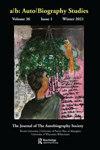We Are Here: Jesmyn Ward’s Black Feminist Poethics of Place in Men We Reaped
Q1 Arts and Humanities
引用次数: 0
Abstract
Abstract This essay explores how, in her memoir Men We Reaped, Jesmyn Ward confronts Mississippi’s pervasively anti-Black landscape and maps an oppositional geography that documents Black life in the landscape while also accounting for the constant movement brought on by slavery’s afterlives. Throughout the work, Ward engages in what the author terms Black feminist reaping, which operates as a cartographic practice that makes visible Black subjects situated at the margins of places that are designed to suppress and confine them. Through Black feminist reaping, Ward enacts a Black gathering—a countermobilization against the ways the plantation and its politics continue to reemerge in Mississippi’s geography and US geographies more broadly. In the process, Ward produces new geographic knowledges that highlight a Black viability, which undergirds sustainable communities and complex Black subjectivities.《我们在这里》:杰斯明·沃德的《我们收获的男人》中的黑人女权主义政治伦理学
本文探讨了杰斯明·沃德在她的回忆录《我们收割的男人》中如何面对密西西比州普遍存在的反黑人景观,并绘制了一幅对立的地理图,记录了黑人在景观中的生活,同时也说明了奴隶制后的生活带来的持续运动。在整个作品中,沃德参与了作者所说的黑人女权主义收获,这是一种制图实践,使黑人主体处于旨在压制和限制他们的地方的边缘。通过黑人女权主义者的收获,沃德促成了一场黑人的集会——一场对抗种植园及其政治在密西西比州和更广泛的美国地理中不断重新出现的方式的动员。在这个过程中,沃德产生了新的地理知识,强调了黑人的生存能力,这是可持续社区和复杂的黑人主体性的基础。
本文章由计算机程序翻译,如有差异,请以英文原文为准。
求助全文
约1分钟内获得全文
求助全文
来源期刊

a/b: Auto/Biography Studies
Arts and Humanities-Literature and Literary Theory
CiteScore
0.80
自引率
0.00%
发文量
27
期刊介绍:
a /b: Auto/Biography Studies enjoys an international reputation for publishing the highest level of peer-reviewed scholarship in the fields of autobiography, biography, life narrative, and identity studies. a/b draws from a diverse community of global scholars to publish essays that further the scholarly discourse on historic and contemporary auto/biographical narratives. For over thirty years, the journal has pushed ongoing conversations in the field in new directions and charted an innovative path into interdisciplinary and multimodal narrative analysis. The journal accepts submissions of scholarly essays, review essays, and book reviews of critical and theoretical texts as well as proposals for special issues and essay clusters. Submissions are subject to initial appraisal by the editors, and, if found suitable for further consideration, to independent, anonymous peer review.
 求助内容:
求助内容: 应助结果提醒方式:
应助结果提醒方式:


